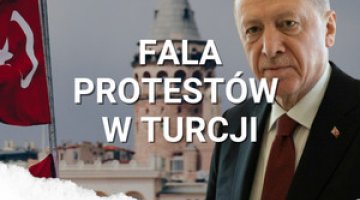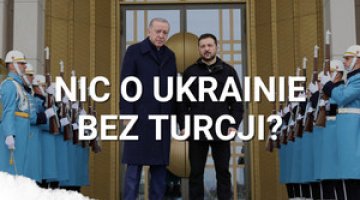Turkey: managing the crisis by using conflict
Since the end of July, Turkey has become the scene of daily military, police and terrorist operations, and also of public protests resulting from the government’s launch on 24 July of an anti-terrorist campaign, nominally aimed against the Islamic State, but which in practice has mainly been targeted at Kurdish forces linked to the Kurdistan Workers’ Party (PKK). The campaign planned by the government in Ankara, and the attacks which have resulted from it, have significantly destabilised the situation in the country (at least in the short term), affected the ongoing talks on forming a coalition government, prevented the AKP from winning outright in the June elections, and also testify to a significant increase in Turkey’s involvement in the Middle East.
So far, the situation seems to be developing in line with the assumptions of the Justice and Development Party (AKP), which has been ruling Turkey since 2002: escalating the conflicts and using them to manage the situation has strengthened the AKP, weakened its political rivals, and allows it to consider launching a political counteroffensive, such as early elections in which the AKP could hope to win a parliamentary majority. In regional terms, the anti-terrorist campaign primarily gives the AKP hope of weakening the Kurds’ ongoing rise in strength and empowerment, which is dangerous for Turkey.
The anti-terror campaign
Turkey’s current anti-terrorism campaign was initiated on July 24, after a spectacular bombing in Suruç on 20 July attributed to the Islamic State. In a reversal of its previous policy, Ankara began bombing IS targets in Syria, made the airport in Incirlik available to the US air force to launch further attacks, and proceeded to arrest people suspected of having ties with the IS in Turkey. At the same time, Ankara began large-scale military action against the PKK in Turkey and Iraq, in response to Kurdish attacks on elements of the Turkish security forces suspected of supporting the Islamic State in secret. Currently, it is the PKK, not the IS, which is the main target of the Turkish anti-terrorist campaign.
As a result of the anti-terrorist campaign (according to estimates in the Turkish media which are difficult to verify), almost 2000 people suspected of having ties with the PKK (mainly), the IS and other organisations have apparently been arrested so far. As a result of the bombing and military actions in Iraq and Turkey, at least 400 PKK fighters (including important commanders) have been reported killed. Tremendous political and media pressure has been brought to bear on the Kurdish-linked Peoples’ Democratic Party (HDP), whose entrance into parliament after the June elections deprived the AKP of a parliamentary majority.
Meanwhile attacks are being launched daily, mainly by the Kurds. These are primarily bombings (including the use of roadside mines, car bombs and suicide attacks), and the shelling and bombardment of police and military units in the eastern part of the country. In recent weeks around 20-40 people have been killed. Meanwhile, the Baku-Tbilisi-Erzurum gas pipeline to Turkey from Iran and the oil pipeline from Iraqi Kurdistan (the KRG) to Turkey have been holed and temporarily blocked; these actions have been blamed on the PKK. There have been several anti-government demonstrations and street clashes between the police and Kurds (in Cizre and Istanbul, among other places). Other terrorist circles in Turkey have also reactivated their operations, with a particularly spectacular (albeit ineffective) attack by the leftist Revolutionary People’s Liberation Party-Front (DHKP-C) on the US consulate in Istanbul on 10 August.
Political consequences
The anti-terrorist campaign is the most important action undertaken by the Turkish government since the parliamentary elections in June; the ruling AKP won the largest number of seats, although it has been forced to carry out tedious and unwanted talks on forming a coalition government. One important reason (if not the most important) for starting the current anti-terrorist campaign, therefore, is a desire to improve the position of the AKP (both that of the party and of President Recep Tayyip Erdoğan) on the political scene during this period of political tension: for the AKP to dominate a possible coalition, or – ideally – to hold early elections which the AKP could win outright. At the regional level, the campaign’s main objective is to stem the dynamic process of emancipation, consolidation and empowerment of the Kurds (both in Syria and Iraq, and by extension those in Turkey) by weakening their military capabilities; internationally isolating the PKK, who are the strongest among the Kurdish groups; and creating and staging tensions among the various Kurdish forces.
The current course of events in Turkey seems to support the AKP’s calculations:
- The anti-terrorist campaign and the media campaign accompanying it are being waged unexpectedly effectively: the PKK’s losses are presented as huge, while its retaliation is shown as relatively limited and localised (compared both with the clashes in the 1980s and 1990s, as well as the period of conflict in the years 2011-2).
- The campaign against the PKK (and the IS) is allowing the AKP to recover its credibility with the nationalist and conservative parts of Turkish society; and within the army, which had been feeling distanced from the AKP-branded peace process with the Kurds, and is tied to a centralised, secular state model. Thus, the AKP hopes to act as a credible proponent of socially attractive slogans, collecting / recovering the nationalist electorate of the People’s National Party (MHP), and perhaps also the leftist and statist Republican People’s Party (CHP). In the short term this will reinforce the AKP in its coalition talks, and could bring it improved electoral results; according to unpublished polls which the Turkish media have referred to, the AKP would win the elections today.
- The campaign could neutralise the major challenge to the Turkish government and state posed by the Kurds. The fight against the PKK should scare the Kurds, by offering the prospect of returning to the past state of de facto civil war, and discouraging them from radical actions and attitudes. The attacks on the PKK have already weakened both this organisation and the relative unity of the Kurds, especially since they are being coordinated with political attacks on the HDP and active political intrigues with different groups of Iraqi and Syrian Kurds. From the AKP’s perspective, the disintegration of Kurdish communities at home and abroad, and the weakening, marginalisation, and ultimately de-legalisation of the HDP would lend credence to the prospect of a crushing victory for the AKP in early elections (the HDP’s unexpected crossing of the 10-percent threshold ‘deprived’ the AKP of seats in the June elections which would have ensured it a parliamentary majority). The significant weakening or elimination of the PKK and the HDP, and the intrigues aimed at deepening the divisions among Kurds throughout the Middle East, would also remove the prospect of an independent Kurdistan emerging, which would be dangerous for Turkey.
- Internationally, the fight against the IS (but not the Kurds), and opening Turkey’s airports to the US Air Force, are attempts to rebuild Ankara’s prestige and credibility in the Middle East. The balance of enormous ambitions and very limited results in the Middle Eastern game (which is unfavourable for Turkey), and the steady rise in disagreements between Ankara and Washington, are likely to be corrected. If Ankara were included in the coalition’s activities, it would benefit in the short term from the US’s informal agreement to create a special security zone in Syria on the Turkish border, which would de facto be managed by Turkey. Ankara has unsuccessfully tried to promote this idea since the beginning of the war in Syria, and its implementation would increase Turkey’s security, relieve the problem of Syrian refugees in Turkey, and finally get Ankara actively involved in the Syrian (and Kurdish) power-play, by using local Syrian forces.
Summary
Regardless of the current problems (attacks, combat, protests) and Ankara’s possible successes in the coming months (political stabilisation and social consolidation if the AKP can reconstruct its dominant position), Turkey’s domestic and regional situation is, and will probably remain, increasingly complicated and fraught with huge potential instability. There is no real alternative to the ruling AKP on the Turkish political scene, although it faces a long list of challenges and a large number of people dissatisfied with the government’s action. Actually, as it seems, by far the most attractive and effective way for the Turkish government to deal with its problems is not so much dialogue and political compromise as skilful managing, channelling, and possibly creating conflicts and crises, both internal and formally external (Syria, Iraq), with the latter increasingly affecting the situation in Turkey itself.




